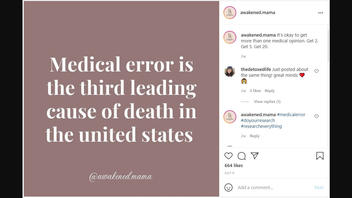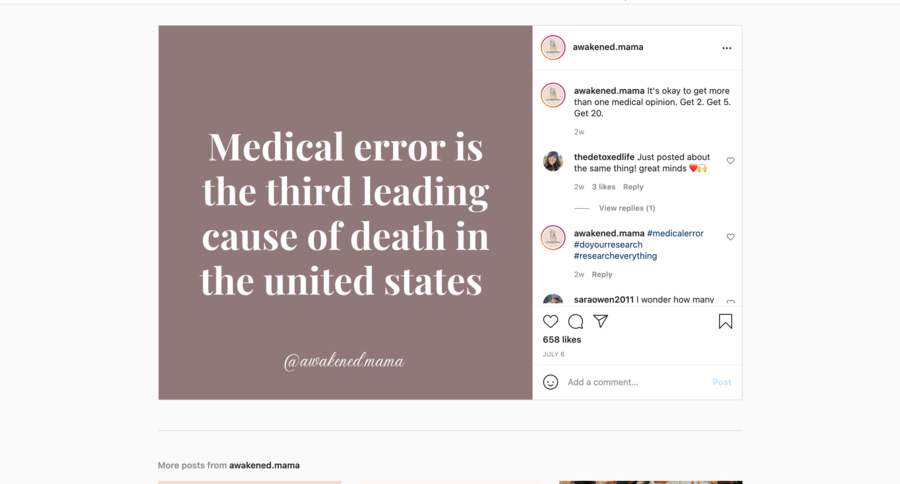
Is "medical error" the third leading cause of death in the United States? No, that's not proven: The Centers for Disease Control and Prevention does not include "medical error" in the top 10 leading causes of death in the United States.
For one thing, given the lack of a precise medical or legal definition for "medical error," it's difficult to quantify such in statistical data.
The claim appeared in an Instagram post published on July 6, 2021. It read:
Medical error is the third leading cause of death in the united states
This is what the Instagram post looked like at the time of writing:
The post cites no source for the claim.
Lead Stories emailed the CDC regarding the claim. We were referred to an article published by researchers from the CDC and the National Center for Health Statistics (NCHS) with a chart (below) on leading causes of death for the years from 2015 through 2020:
"Medical error" is nowhere on the list.
In an email sent to Lead Stories on July 21, 2021, a CDC statement from the agency's mortality statisticians explained why medical errors are not included among the leading causes of death:
There are two reasons ... First, complications of medical and surgical care are not considered to be the underlying cause of death according to the standard ICD coding rules promulgated by the World Health Organization and used by the CDC's National Center for Health Statistics (NCHS). ICD coding rules prefer selection of the disease or condition for which the decedent was being treated (if reported) as the underlying cause. The assumption is that prevention of the underlying condition would obviate the need for medical intervention. Second, medical errors are often simply not reported on the death certificate.
ICD stands for International Classification of Diseases.
For the CDC, "Complications of Medical and Surgical Care" include the adverse effects of drugs and medical devices, medical misadventures (i.e. errors), and complications of surgery and medical procedures.
The email continues with why labeling a death due to medical error can be problematic:
Studies published over the past 15 years or so have shown a wide range of estimates on the number of deaths per year which are due to medical errors. But as most of these studies are based on small, potentially unrepresentative samples, they can be methodologically problematic, especially when attempting to extrapolate results to the entire United States. Some studies have also conflated complications of medical care with "medical errors". Not all complications are the result of error, nor are all preventable or avoidable. While such studies can be informative and useful, they also have important limitations and the results should be interpreted with caution.
NCHS is currently working to develop and enhance materials to educate and train physicians and other cause of death certifiers on the importance of providing accurate and complete cause of death statements.
There is a mix of opinion, though, on medical errors as a leading cause of death, and even what constitutes "medical errors" as a category.
A 2016 article by Johns Hopkins Medicine, titled "Study Suggests Medical Errors Now Third Leading Cause of Death in the U.S. -- Physicians advocate for changes in how deaths are reported to better reflect reality" said that, "Johns Hopkins patient safety experts have calculated that more than 250,000 deaths per year are due to medical error in the U.S."
The Johns Hopkins article continued:
The Johns Hopkins team says the CDC's way of collecting national health statistics fails to classify medical errors separately on the death certificate. The researchers are advocating for updated criteria for classifying deaths on death certificates.
More recently, an article from YaleNews published on January 28, 2020, discusses studies of preventable hospital deaths and says:
Previous estimates of preventable deaths of hospitalized patients may be two to four times too high, a new Yale School of Medicine study suggests.
From the article:
The new study also shows that the number of previously healthy people who die every year from hospital error is about 7,150. The remainder of preventable deaths occurred in patients with less than a three-month life expectancy.
Most of the hospital errors involved poor monitoring or management of medical conditions, diagnostic errors, and errors related to surgery and procedures, the study shows.
The article and the Yale School of Medicine study focused on "preventable hospital deaths," which would not include deaths from non-hospital "medical errors" -- but does indicate the difficulty in quantifying what would come under the broader category of deaths due to "medical errors."
A second part of the post on Instagram by awakened.mama added, "It's okay to get more than one medical opinion. Get 2. Get 5. Get 20."
That "get a second opinion" treatment strategy is something that the medical community generally approves of.
Dr. Anees Chagpar, a breast surgeon and a Yale Medicine specialist, said in a January 15, 2020, article that a second opinion can't hurt.
Second opinions are commonplace these days ... And just like with any major decision -- buying a house or a car or going to college -- it's not a bad idea to go to a couple of places to be sure you know what you're getting and why."


















